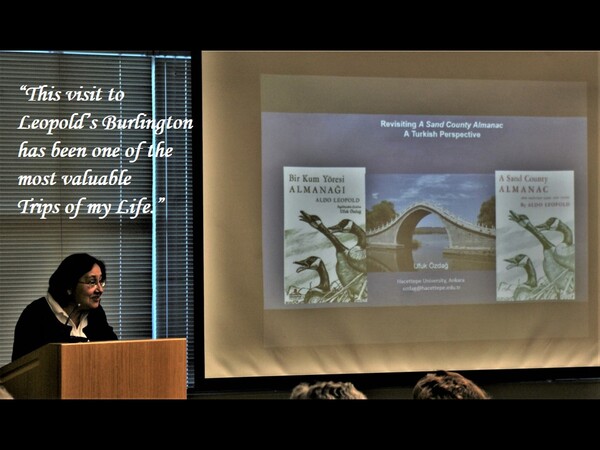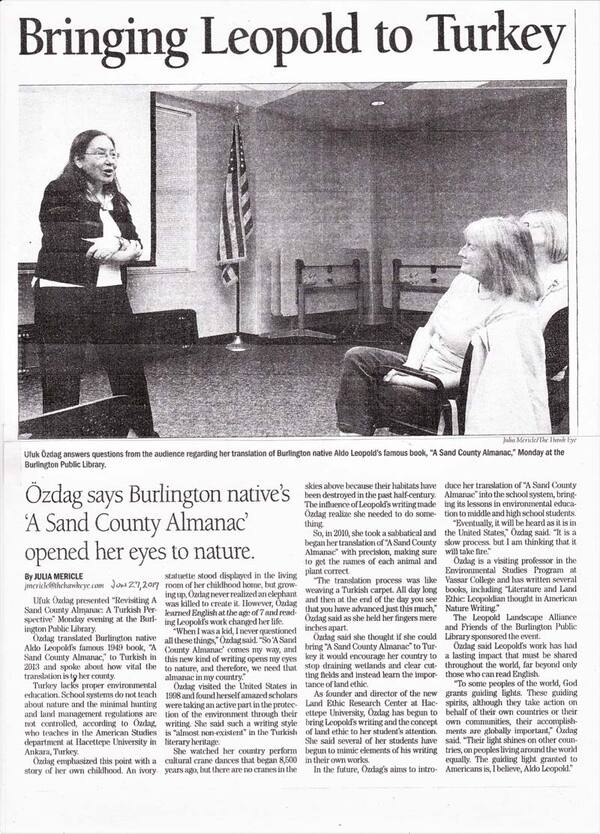Dr. Özdağ Page

Dr. Özdağ's full report on her visit to Burlington, Iowa:
HACETTEPE ÜNİVERSİTESİ
TOPRAK ETİĞİ UYGULAMA VE ARAŞTIRMA MERKEZİ
Land Ethic Research and Application Center
Reflections on my Visit to Leopold Landscape Alliance\
June 25-27, 2017, Burlington, Iowa
Ufuk Özdağ
Dear Distinguished Aldo Leopold Foundation Board Members, Leopold Landscape Alliance Board Members, and Members of the Leopold Family,
I visited Burlington, Iowa, the historically significant city of Aldo Leopold’s boyhood years, on June 25-27, 2017, upon the kind invitation of Leopold Landscape Alliance President, Steve Brower. Landscape architect, naturalist, and historian, Steve’s kind planning of the three-day-long visit, full of excursions to Leopold sites, and his informed explanations of Leopold’s early years, has been one of the most valuable trips of my life. In this three day long visit, I had the unique opportunity (as a Turkish Leopold scholar) to learn and explore the boyhood years of the guiding light that the United States and the world have been blessed with, for many decades.
It is now widely acknowledged that Leopold’s thoughts, words, and deeds are not for an age only, but for all time. His global impact became evident when his timeless book, A Sand County Almanac, was chosen as one of the ten books that changed the world (The Guardian, 7 August 2015).
The delegates of the Sixth World Wilderness Congress (1998) resolved that the 21st century be declared “the Century of Restoring the Earth.” More recently, Scott Russell Sanders, in his “A Conservationist Manifesto,” has made a forceful call for land restoration, saying “[c]onservation means not only protecting the relatively unscathed natural areas that survive, but also mending, so far as possible, what has been damaged” (211). Restoration of degraded lands and diminished wildlife populations is the grand legacy of Aldo Leopold. Therefore, I envision that Leopold will have a growing impact in “the Century of Restoring the Earth.” His thoughts, words, and deeds will be the Path for not only conserving lands but also restoring damaged lands, across the world.
My exploration of Leopold’s Burlington roots gave me many insights into the philosophy of Leopold, as it was here, also, that the seeds of nature love as well as “land restoration” were planted. During Aldo Leopold Foundation’s “Building a Land Ethic 2017” conference, I had the chance to listen to Steve’s presentation on the “Roots of the Land Ethic” which highlighted many aspects of Leopold’s early life. And during my Burlington visit, right after the conference, I had the chance to observe, through Steve’s guidance, the Leopold sites, particularly the historical location in front of the Starker Leopold House, the place where Leopold was first exposed to the idea of land restoration at about the age of seven, which must have moulded his entire life. Steve explained to me that in this very location, Leopold, with his parents, grandparents, and siblings, did woodland wildflower restoration by collecting seeds of the native plants. In line with this philosophy, the Leopold Middle School in Burlington Iowa (opened in 2010) has restored a tract of land in the frontyard of the school, and now this impressive “prairie garden” is being used for outdoor classes. It is a heart-warming development that the middle school students, at this early age, are getting exposed to not only nature love but also to the idea of “land restoration,” which will mould the lives of many young graduates, to impact the health of the planet.
Over the years, I have worked with the distinguished Aldo Leopold Foundation, and became witness to the effective spreading of the Land Ethic studies, from Baraboo Wisconsin to diverse corners of the world. At the Leopold Center, I saw the graceful ways in which land protection and land restoration are carried out—“weaving a land ethic into the fabric of our society” (ALF web page), in ways that I had never seen before. As a foreign scholar with an objective outlook, I’m imagining that, over the years, Leopold’s birth and childhood lands will also be immensely important to the future of this unique “land ethic” philosophy. Once this location is well-known and often-visited in the world (as is the Leopold Center in Baraboo, WI), it will contribute to the global Land Ethic heritage. It is wonderful that the Leopold Landscape Alliance has done tremendous work for the purchase of the Leopold Boyhood House. The next step could be the foundation of a possible “Leopold Education Center” in this very location. I’m imagining that once the Starker Leopold House, Leopold Boyhood House, and the Barn House in the middle, could operate in unison, LLA will be ready to host both national and international visitors travelling to Burlington to visit the “Leopold Education Center” (Starker Leopold House), “Visitor Center and Guest House” (Leopold Boyhood House), and Conference Hall (the Barn House in the middle of the two houses). As a matter of fact, the Barn House could start hosting educational seminars right away, if the present owners can kindly give the permission for the educational activities in such a critical time in the environmental history of the world.
As I have raised the humanities question, some think it was Aldo's classic secondary education that served as the source of his insight, that he took his books (metaphorically) into the woods to find meaning. But, what I am actually saying is that much earlier, during primary education or sooner, the discovery of surprise & curiosity in the wilds created a good feeling, all stimulated within the family by connecting the humanities to nature through the adventure literature. And he brought this to the school books.
These are the words of Steve Brower (personal communication, July 10, 2017), who felt the energy in the Burlington air many decades ago. And now, having visited Leopold’s boyhood lands, I am convinced that this energy will pull more Leopold enthusiasts to this special city, in the near future. I share Steve’s idea that it is also the childhood years that has an impact on the evolution of a genious (I will not repeat what Steve has written in his essay, “Aldo Leopold’s Youthful Discoveries” in The Leopold Atlas).
I believe that LLA’s educational activities in this meaningful atmosphere will be important, as well, for the future land stewards, as complementary activities to the Aldo Leopold Foundation’s diverse activities/events/conferences in Wisconsin, Baraboo. Both the national and the international Leopold enthusiasts will have a shelter in Burlington, once they arrive to explore the lands that had an early impact on the global land ethic philosophy. In this unique location where Leopold grew up, they will have the chance to explore Leopold’s whole story. The LLA in Burlington will also give the enthusiasts the unique opportunity to visit the tramping sites, the Crystal Lake Hunting Club, and many other locations that had a crucial role in the evolution of Leopold’s Land Ethic philosophy that is changing the world. An additional site of Leopold celebration is the Aldo Leopold Middle School Prairie Classroom, which has many components that recall Aldo’s experiences. For Aldo Lepold's home town region to impact global environmental conditions, I hope that LLA will receive the support to achieve its long-range goals.
May these ideas based on my visit to the Leopold Landscape Alliance, in Burlington, spark more conversations for deepening the roots of the grand Leopold heritage.
Cordially Yours,
Ufuk Özdağ, PhD
Professor of American Culture & Literature, Director of Land Ethic Center
Hacettepe University, Ankara, Turkey
Dr. Özdag's visit to Burlington is a part of the Leopold Landscape Alliance's Researcher/Artist/Writer in Residence program. She has recently been translating more of Leopold's essays from Round River and is coming to Burlington to study the more detailed nuance found in Leopold's writing. Aldo's hometown experience in nature and with human nature surfaces in many of the essays.
As Aldo said, "nothing so important as an ethic is ever 'written'...it evolve(s) in the minds of a thinking community."
Ufuk is particularly interested in seeing and experiencing the home grounds and tramping places that first aroused Aldo's curiosity and illuminated his perception of values. The observations and writing of his earliest experiences set the stage for all that followed.
The Starker-Leopold family stimulated the youngsters at an early age by teaching how all the humanities are connected to nature. Adventures in literature, art, music, geography and even gardening encouraged the children to seek out parallel experiences in their own expanding world. This gave the opportunity for comparison to the insights and values of the writers, artists, musicians, and naturalists they were learning about.
At the turn of the last century, Aldo's mother, Clara Starker Leopold, urged all of her children to write notes and journals about everything they experienced so the family in Burlington could stay connected with their adventures and developing ideas when they travelled out during their educations. In the case of Aldo, who they expected to follow a career in the natural sciences, this became a habit of observation and description that set a pattern for life..
Round River & Other Essays on Conservation: -- A Sampler of Thoughtful Leopold Quotes
Included in the 1966 Edition of A Sand County Almanac is "Other Essays on Conservation from Round River". Within these essays are many references to his childhood experiences, some obvious and some not so much. Ufuk's most recent translations have the task of interpreting Leopold's lyrical style and his sometimes not so evident underlying meaning. Here is a sampling of Aldo's thinking and writing found among the Round River essays -- expressing his thoughtful values found in nature.
In the forward to the 1966 edition of ASCA, Leopold presents his central idea, "That land is a community is the basic concept of ecology, but that land is to be loved and respected is an extension of ethics. That land yields a cultural harvest is a fact long known, but latterly often forgotten."
There is much confusion between land and country. Land is the place where corn, gullies and mortgages grow. Country is the personality of the land, the collective harmony of its soil, life, and weather. Country knows no mortgages, no alphabetical agencies; it is calmly aloof to petty exigencies of its alleged owners. -- "Country"
In searching for that special "something" found in nature, Aldo asked, Have we made any headway in developing 'a refined taste in natural objects'? -- "The Round River
Poets sing and hunters scale the mountains for primarily one and the same reason--the thrill to beauty. Critics write and hunters outwit their game for primarily one and the same reason - to reduce that beauty to possession. The differences are largely matters of degree, consciousness, and that sly arbiter of the classification of human activities, language. If, then, we can live without goose music, we may as well do away with the stars, or sunsets, or Iliads. But the point is that we would be fools to do away with any of them. -- "Goose Music"
I think we have here the root of the problem. What conservation education must build is an ethical underpinning for land economics and a universal curiosity to understand the land mechanism. Conservation may then follow. -- "The Round River"
The common denominator of all hunters is the realization that there is always something to hunt. The world teems with creatures, processes, and events that are trying to elude you. Every ground is a hunting ground, whether it lies between you and the curbstone, or in the illimitable woods where rolls the Oregon. The final test of the hunter is whether he is keen to go hunting in a vacant lot. -- "The Deer Swath"
There are yet many (children) to be born who, like Isaiah, 'may see and know that the hand of the Lord has done this.' But where shall they see, and know, and consider? In museums? -- "Goose Music"
